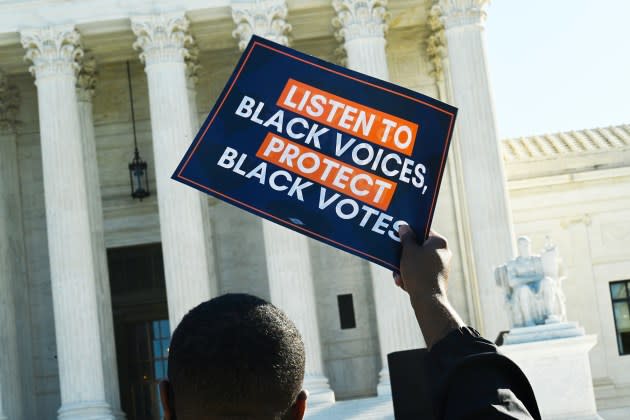Supreme Court Does South Carolina GOP a Solid, Overturns Racial Gerrymander Ruling

The Supreme Court determined on Thursday that South Carolina Republicans did not engage in racial gerrymandering when redrawing the map of the state’s 1st Congressional district, overturning a lower court ruling by the District of South Carolina.
In a 6-3 ruling the conservative majority of the court, comprised of Justices Samuel Alito, John Roberts, Clarence Thomas, Neil Gorsuch, Brett Kavanaugh, and Amy Coney Barrett, held that they saw no evidence that the Republican-controlled state legislature was motivated by racial bias when it removed 30,000 predominantly Black residents from the 1st District — currently held by Republican Rep. Nancy Mace.
Justice Samuel Alito, currently facing scrutiny for his own alleged partisan leanings, wrote for the majority that “because of the tight correlation between race and partisan preferences, this fact does little to show that race, not politics drove the legislature’s choice.”
“The District Court cited no evidence that could not also support the inference that politics drove the mapmaking process and provided no explanation why a mapmaker who wanted to produce a version of District 1 that would be safely Republican would use data about voters’ race rather than their political preferences,” he added.
The result was surprising considering that in two recent cases, the court ruled that Alabama and Louisiana had engaged in racial gerrymandering. South Carolina’s lower court had held that legislators had treated the 1st district “in a fundamentally different way than the rest of the state.”
“The strategies [South Carolina Senate Cartographer Will Roberts] employed ultimately exiled over 30,000 African American citizens from their previous district and created a stark racial gerrymander of Charleston County and the City of Charleston. As Mr. Roberts admitted under the Court’s questioning, the changes he implemented in Charleston County were ‘dramatic’ and ‘created tremendous disparity’ in the placement of African Americans within Congressional Districts,” the lower court wrote.
In a concurring opinion, Supreme Court Justice Clarence Thomas — another staunch conservative facing ethical questions regarding his relationships with prominent Republican donors — wrote that the Supreme Court should cease litigating claims of racial gerrymandering.
“In my view, the Court has no power to decide these types of claims. Drawing political districts is a task for politicians, not federal judges. There are no judicially manageable standards for resolving claims about districting, and, regardless, the Constitution commits those issues exclusively to the political branches,” Thomas wrote.
“The Court’s insistence on adjudicating these claims has led it to develop doctrines that indulge in race-based reasoning inimical to the Constitution,” he added.
More from Rolling Stone
Top Dems Request Meeting With Chief Justice Roberts to Discuss Alito
Supreme Court Architect Flew Same 'Appeal to Heaven' Flag as Alito
Senators Join House Dems in Call for Alito's Recusal Amid Latest Flag Controversy
Best of Rolling Stone

